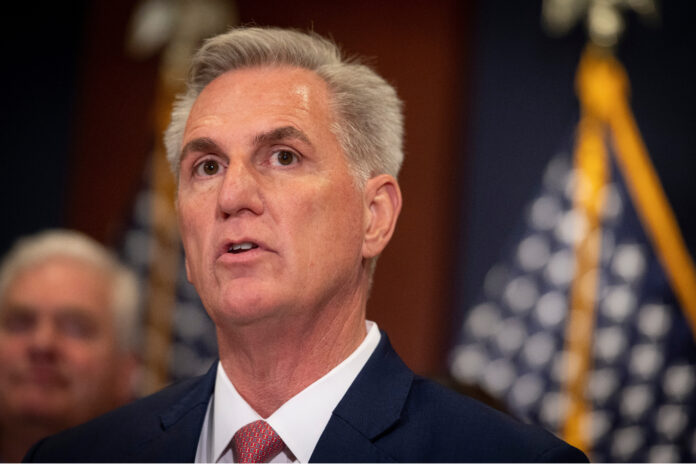
(The Daily Signal) — The House voted Wednesday evening to lift the nation’s debt ceiling and begin to curb government spending, despite resistance from conservatives following weeks of negotiations between Republicans and Democrats.
The vote to pass the debt ceiling bill was 314-117, with some of the House’s most conservative Republicans opposing it as not going far enough to establish fiscal discipline.
A total of 149 Republicans and 165 Democrats voted for the legislation, while 71 Republicans and 46 Democrats voted against it. Another four House members didn’t vote.
Sen. Mike Lee, R-Utah, tweeted that the 71 Republicans were “heroic.”
The Biden-McCarthy Debt Expansion Act just passed the House. To those who thought this was a Republican bill, the numbers don’t lie: 165 Democrats voted for it, and only 149 Republicans joined them. Those voting against it included 71 heroic Republicans and only 46 Democrats. pic.twitter.com/14SmyLsi2t
— Mike Lee (@BasedMikeLee) June 1, 2023
“At a time when American families are suffering from the inflation and interest rate crisis, Congress voted to give [President Joe] Biden a blank check on the debt limit — ensuring that our nation will rack up at least $3.5 trillion in new federal debt before the debt ceiling suspension ends,” said Richard Stern, director of The Heritage Foundation’s Hermann Center for the Federal Budget. (The Daily Signal is the news outlet of The Heritage Foundation.)
“Lawmakers went from the solid down payment of the Limit, Save, Grow Act to very limited savings and growth that does too little to rein in our federal government’s out-of-control spending,” Stern added.
Kevin Roberts, president of The Heritage Foundation, tweeted that the vote showed “which side got more in this ‘compromise.’”
The fact that more Democrats than Republicans voted for the bad debt ceiling deal tells you which side got more in this “compromise.” The everyday American will pay the price, as they always do, for the shortage of elected officials willing to fight for their interests.
— Kevin Roberts (@KevinRobertsTX) June 1, 2023
Biden and House Speaker Kevin McCarthy, R-Calif., reached a deal Saturday that the House speaker described as allowing the nation’s debt to climb while beginning to trim spending. Next, the Senate takes up the legislation.
“Each week, we have stood up for the American public,” McCarthy said at a press conference following the bill’s passage. “Be it a strongest border security. Be it a parents bill of rights so you can have a say in your kid’s education. Be it ending the pandemic or standing up against those who are weak on crime to make our streets safer.”
“Tonight, I hope we proved it to you again that we put the citizens of America first, and we didn’t do it by taking the easy way,” McCarthy said. “We didn’t do it by the ways that people did it in the past, by just lifting it [the debt ceiling]. We decided that you had to spend less, and we achieved that goal.”
The bill as passed would suspend the current debt limit of $31.4 trillion until Jan. 1, 2025, about two months after the presidential election on Nov. 5, 2024, when all 435 House seats and 33 of the 100 Senate seats also are on the ballot across the nation.
The 99-page bill, called the Fiscal Responsibility Act of 2023, would rescind roughly $30 billion of unspent COVID-19 relief funds; completely fund veterans medical care as proposed in the president’s budget for fiscal year 2024, and end a pause in repaying student loans in late August, The Associated Press reported.
The bill emerging from the Biden-McCarthy deal also aims to keep nondefense spending “relatively flat” in fiscal 2024; increase nondefense spending by 1% in fiscal 2025; and accelerate completion of a natural gas pipeline in West Virginia called the Mountain Valley Pipeline, CNN reported.
The House Rules Committee voted 7-6 on Tuesday to advance the legislation to a full House vote Wednesday. Every committee Democrat voted against it, as did two Republicans — Reps. Chip Roy of Texas and Ralph Norman of South Carolina.
“We’re here to let you and the American people know that Speaker McCarthy had a mandate from the American people — negotiated with a powerful negotiation position of a unified Republican Party, not only just in the House, but in the House and Senate—to hold the line for the bill that we passed,” Rep. Scott Perry, R-Pa., chairman of the House Freedom Caucus, told reporters at a press conference Tuesday.
“This deal that we’ve heard about totally fails to deliver on all of it,” Perry said, referring to House Republicans’ Limit, Save, Grow Act of 2023, passed April 26.
Some House Republicans tweeted about the deal Wednesday night:
This is what it looks like when the uniparty cartel sells out the American people. #NoDeal pic.twitter.com/79ufV5d4sx
— Rep. Dan Bishop (@RepDanBishop) June 1, 2023
Heritage Action for America, the grassroots advocacy arm of The Heritage Foundation, opposed the new legislation resulting from the Biden-McCarthy deal.
“This deal does not meet the moment, and it does not address the root problems that have led to nearly $32 trillion in national debt,” Heritage Action said in a written statement. “As members of Congress continue the fight to rein in Washington’s spending addiction and prevent the country’s fiscal ruin, we remain committed to finding solutions to once and for all bend the spending curve down.”
Following the House vote Wednesday evening, the legislation heads to the Democratic-controlled Senate, where Biden has asked senators to vote yes.
Treasury Secretary Janet Yellen set June 5 as the deadline for lawmakers to act in follow-up letters dated Friday to McCarthy, House Minority Leader Hakeem Jeffries, D-N.Y., Senate Majority Leader Chuck Schumer, D-N.Y., and Senate Minority Leader Mitch McConnell, R-Ky.
“Since January, I have highlighted to you the risk that Treasury would be unable to satisfy all of our obligations by early June if Congress did not raise or suspend the debt limit before that time,” Yellen wrote. “In my letters, I also noted that I would continue to update Congress as more information became available.”
“Based on the most recent available data, we now estimate that Treasury will have insufficient resources to satisfy the government’s obligations if Congress has not raised or suspended the debt limit by June 5,” she wrote.
The legislation passed Wednesday evening is different from the Limit, Save, Grow Act, which the House passed April 26. That bill, designed to “limit federal spending, save taxpayer dollars,” and “grow the economy,” passed narrowly by a vote of 217-215 without support from a single Democrat.
In a commentary Wednesday for The Daily Signal, Stern and Preston Brashers, a tax policy analyst at The Heritage Foundation, wrote:
“The rushed agreement between Biden and GOP leadership, named the Fiscal Responsibility Act, includes minimal upfront spending cuts — only 9% of the fiscal year 2024 cuts offered by Limit, Save, Grow — and only includes two years of binding caps on spending growth. It would no longer stop the corporatist Green New Deal subsidies or the illegal student loan cancellations, and it rescinds only 2% of the extra money for the IRS.
The debt ceiling agreement includes minuscule work requirement increases for Supplemental Nutrition Assistance Program recipients and hollows out the solid deregulatory wins of Limit, Save, Grow.”
These are the 71 House Republicans who voted against the deal:
Mark Alford (Mo.)
Andy Biggs (Ariz.)
Dan Bishop (N.C.)
Mike Bost (Ill.)
Josh Brecheen (Okla.)
Vern Buchanan (Fla.)
Ken Buck (Colo.)
Tim Burchett (Tenn.)
Eric Burlison (Mo.)
Kat Cammack (Fla.)
John R. Carter (Texas)
Ben Cline (Va.)
Michael Cloud (Texas)
Andrew Clyde (Ga.)
Mike Collins (Ga.)
Eli Crane (Ariz.)
Scott DesJarlais (Tenn.)
Byron Donalds (Fla.)
Pat Fallon (Texas)
Brad Finstad (Minn.)
Michelle Fischbach (Minn.)
Russell Fry (S.C.)
Russ Fulcher (Idaho)
Matt Gaetz (Fla.)
Tony Gonzales (Texas)
Bob Good (Va.)
Lance Gooden (Texas)
Paul Gosar (Ariz.)
Morgan Griffith (Va.)
Michael Guest (Miss.)
Harriet Hageman (Wyo.)
Andy Harris (Md.)
Diana Harshbarger (Tenn.)
Kevin Hern (Okla.)
Clay Higgins (La.)
Wesley Hunt (Texas)
Ronny Jackson (Texas)
Darin LaHood (Ill.)
Debbie Lesko (Ariz.)
Anna Paulina Luna (Fla.)
Morgan Luttrell (Texas)
Nancy Mace (S.C.)
Tracey Mann (Kansas)
Brian Mast (Fla.)
Rich McCormick (Ga.)
Mary Miller (Ill.)
Cory Mills (Fla.)
Alex Mooney (W.V.)
Barry Moore (Ala.)
Nathaniel Moran (Texas)
Ralph Norman (S.C.)
Andy Ogles (Tenn.)
Gary Palmer (Ala.)
Scott Perry (Pa.)
Bill Posey (Fla.)
John Rose (Tenn.)
Matt Rosendale (Mont.)
Chip Roy (Texas)
George Santos (N.Y.)
Keith Self (Texas)
Pete Sessions (Texas)
Victoria Spartz (Ind.)
Greg Steube (Fla.)
Dale Strong (Ala.)
Tom Tiffany (Wis.)
William Timmons (S.C.)
Jefferson Van Drew (N.J.)
Beth Van Duyne (Texas)
Mike Waltz (Fla.)
Randy Weber (Texas)
Ryan Zinke (Mont.)










